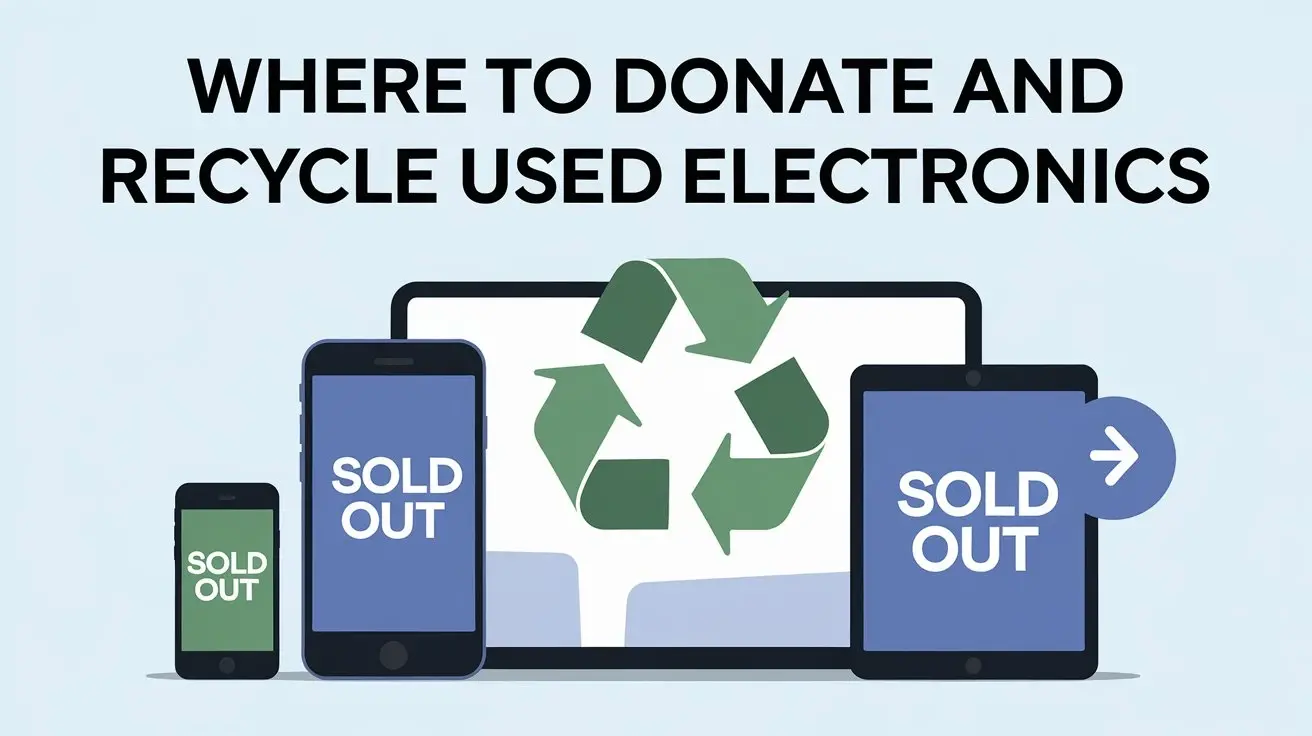
Donating and recycling used electronics responsibly is crucial for environmental protection and data security. This guide provides comprehensive, up-to-date information on where to find trusted donation centers and recycling facilities, ensuring your old gadgets get a new life or are disposed of safely.
Understanding E-Waste and Its Impact
Electronic waste, or e-waste, refers to discarded electrical or electronic devices. As technology advances at an unprecedented pace, the lifecycle of our gadgets shortens, leading to a massive surge in e-waste generation. In 2025, global e-waste is projected to reach a staggering 130 million metric tons annually, a significant increase from previous years. This exponential growth presents a critical environmental and societal challenge.
The composition of e-waste is complex, containing both valuable materials and hazardous substances. Precious metals like gold, silver, copper, and palladium are often found in electronics, making recycling economically viable and environmentally beneficial by reducing the need for virgin material extraction. However, e-waste also contains toxic elements such as lead, mercury, cadmium, and flame retardants. When improperly disposed of in landfills, these toxins can leach into the soil and groundwater, contaminating ecosystems and posing serious health risks to humans and wildlife. The World Health Organization (WHO) has linked improper e-waste handling to various health issues, including respiratory problems, neurological damage, and developmental issues in children.
Furthermore, the improper disposal of e-waste often involves informal recycling practices, particularly in developing countries. These methods, which may include burning to extract metals, expose workers and communities to dangerous fumes and toxic residues. This highlights the critical need for responsible e-waste management systems that prioritize both environmental safety and worker well-being.
Understanding the scope of this problem is the first step towards finding effective solutions. By choosing to donate or recycle our used electronics, we actively participate in mitigating these negative impacts and contribute to a more sustainable future. This guide will equip you with the knowledge and resources to make informed decisions about your old devices.
What Constitutes E-Waste?
E-waste encompasses a broad range of electronic products that are nearing the end of their useful life. This includes, but is not limited to:
- Computers and Peripherals: Desktops, laptops, monitors, keyboards, mice, printers, scanners.
- Mobile Devices: Smartphones, tablets, feature phones.
- Home Appliances: Refrigerators, washing machines, microwaves, toasters, blenders.
- Entertainment Electronics: Televisions, DVD players, game consoles, stereos, cameras.
- Office Equipment: Fax machines, copiers, projectors.
- Batteries: Rechargeable batteries found in many electronic devices.
Even small items like cables, chargers, and adapters fall under the e-waste umbrella. Recognizing the vast array of items that contribute to e-waste helps in understanding the scale of the challenge and the importance of proper disposal for each category.
Environmental and Health Risks of Improper Disposal
The consequences of not properly managing e-waste are severe and far-reaching:
- Toxic Leaching: Heavy metals like lead (found in CRT monitors and solder) and mercury (found in LCD screens and fluorescent bulbs) can contaminate soil and water. Cadmium, used in batteries and circuit boards, is also highly toxic.
- Air Pollution: Burning e-waste releases harmful dioxins and furans into the atmosphere, contributing to respiratory illnesses and other health problems.
- Resource Depletion: Discarding electronics means losing valuable, finite resources that could be recovered and reused, increasing the demand for mining and manufacturing new products, which are themselves energy-intensive and environmentally damaging.
- Landfill Space: E-waste takes up valuable landfill space, and due to its toxic components, it can pose long-term environmental hazards even within a landfill.
By contrast, responsible recycling and donation divert these materials from landfills and hazardous disposal methods, promoting a circular economy and protecting both the environment and public health.
Preparing Your Electronics for Donation or Recycling
Before you hand over your old gadgets, proper preparation is essential. This not only ensures that the donation or recycling process is smooth but, more importantly, protects your personal data from falling into the wrong hands. Data breaches originating from discarded devices are a significant concern, and taking a few simple steps can prevent identity theft and privacy violations.
Data Wiping and Security: Your Top Priority
This is the single most critical step. Simply deleting files or formatting a drive is not enough. Data can often be recovered using specialized software. You need to perform a secure data wipe.
- For Computers (Laptops and Desktops):
- Backup Your Data: Before you begin wiping, ensure you have backed up any important files you wish to keep to an external hard drive, cloud storage, or a new device.
- Use Secure Erase Software: Most operating systems have built-in tools, but dedicated software is often more effective. For Windows, options include DBAN (Darik's Boot and Nuke) or built-in secure erase functions in some SSD manufacturers' tools. For macOS, Disk Utility offers a secure erase option. These tools overwrite the data multiple times, making recovery virtually impossible.
- Physical Destruction (for Hard Drives): For maximum security, especially if the device is not being donated for reuse, consider physical destruction of the hard drive. This can involve drilling holes through the platters or using a professional shredding service. Many electronics recyclers offer this service.
- For Smartphones and Tablets (iOS and Android):
- Backup: Back up your photos, contacts, and other data using cloud services (iCloud, Google Drive) or by connecting to a computer.
- Sign Out of Accounts: Log out of all accounts, including Apple ID, Google Account, iCloud, and any social media or banking apps.
- Factory Reset: Perform a factory reset. On iOS, go to Settings > General > Transfer or Reset > Erase All Content and Settings. On Android, go to Settings > System > Reset options > Erase all data (factory reset). Ensure encryption is enabled on your device before resetting, as this adds another layer of security.
- Remove SIM and SD Cards: Always remove your SIM card and any external SD cards. These can store personal information.
- For Other Devices (Smart TVs, Gaming Consoles, etc.):
- Consult the device's manual or manufacturer's website for instructions on performing a factory reset or clearing user data. Many smart devices store login credentials and browsing history.
Cleaning and Assessment
Once your data is secure, give the electronics a good clean. This makes them more appealing for donation and helps recyclers identify components more easily.
- Wipe down surfaces with a dry or slightly damp cloth. Avoid harsh chemicals that could damage the device.
- Ensure all accessories that came with the device (chargers, remotes, cables) are included if possible, as this increases its value for donation or makes it easier for recyclers to process.
- Assess the condition of the device. If it's still functional, donation is a great option. If it's broken or obsolete, recycling is the way to go.
Checking for Recycling or Donation Eligibility
Some donation centers may have specific requirements regarding the age or condition of electronics they accept. Similarly, recyclers might have restrictions on certain types of batteries or devices. It's always a good idea to check the website or call ahead to confirm their policies before you make a trip.
Where to Donate Used Electronics
Donating functional electronics is a fantastic way to give your old devices a second life, help individuals and organizations in need, and reduce waste. Many non-profits, schools, and community centers are eager to accept working computers, smartphones, tablets, and other gadgets. Choosing a reputable donation center ensures your items are used for their intended purpose and not simply resold or improperly handled.
Charitable Organizations
Numerous charities specifically focus on refurbishing and distributing electronics to underserved communities, students, or individuals with disabilities. These organizations often provide a vital link to technology for those who cannot afford it.
- Computers with Causes: This organization accepts donations of used computers and other electronics, refurbishes them, and provides them to individuals, families, and non-profit organizations in need. They often have drop-off locations or can arrange for pick-ups.
- Human I-T: Human I-T aims to bridge the digital divide by providing low-cost technology and internet access to communities. They accept a wide range of electronics and have donation points across various states.
- Local Schools and Libraries: Many local educational institutions and public libraries can benefit from donations of functional computers, tablets, or projectors. They might use them in computer labs, for student loaner programs, or for community workshops.
- Senior Centers and Community Centers: These organizations can often use simple electronics like radios, older televisions, or basic computers for their residents or for educational programs.
- Veteran Organizations: Some organizations that support veterans may accept electronics that can help veterans stay connected with family, access job resources, or participate in online training.
Retailer Donation Programs
Some major electronics retailers have partnered with charities or run their own donation programs. These can be convenient drop-off points.
- Best Buy: Best Buy has a robust recycling program that also accepts donations. While primarily focused on recycling, they sometimes partner with organizations that can refurbish items. Check their website for current initiatives and accepted items.
- Staples: Staples often accepts electronics for recycling, and some locations may have partnerships for donations of working office equipment or computers.
How to Find Local Donation Centers
The best donation options are often local. Here’s how to find them:
- Online Search: Use search terms like "donate used electronics [your city/state]", "computer donation non-profit", or "recycle electronics for charity".
- Local Government Websites: Your city or county's waste management or sustainability department might have a list of local donation and recycling resources.
- Charity Navigator or GuideStar: These platforms can help you find reputable charities in your area that might accept electronics donations.
- Call Ahead: Always confirm what types of electronics they accept, their condition requirements, and their operating hours before visiting.
Donating vs. Recycling: When to Choose Which
Donate if:
- The electronic device is in good working condition.
- It is relatively modern and functional (e.g., a computer that can still run current software, a smartphone with a working battery).
- It comes with necessary accessories (chargers, cables).
Recycle if:
- The device is broken, obsolete, or beyond repair.
- It is heavily damaged or missing critical components.
- You are unsure if it's suitable for donation, but it contains valuable materials.
Where to Recycle Used Electronics
When donating isn't an option, responsible recycling is paramount. This ensures that hazardous materials are managed safely and valuable resources are recovered. Many programs and facilities are available, ranging from manufacturer take-back programs to municipal collection events and certified e-waste recyclers.
Manufacturer Take-Back Programs
Many electronics manufacturers offer recycling programs for their own products, often free of charge. This is a great option for ensuring your device is handled by the company that understands its components best.
- Apple: Offers recycling programs for its products, often through retail stores or mail-in options.
- Dell: Has a comprehensive recycling program, including mail-back options and partnerships with retailers.
- HP: Provides various recycling solutions, including in-store drop-off and mail-back services.
- Samsung: Offers recycling programs for its devices, often accessible through their website or retail partners.
Check the manufacturer's website for specific details on their recycling initiatives.
Retailer Recycling Programs
Major electronics retailers are increasingly offering convenient recycling services for consumers.
- Best Buy: This is one of the most comprehensive retail recycling programs. They accept a wide range of electronics, including TVs, computers, cell phones, and more, regardless of where they were purchased. Some items may have a small fee, but many are free to recycle.
- Staples: Offers in-store recycling for many electronics, including ink cartridges, batteries, and small electronics.
- Office Depot/OfficeMax: Similar to Staples, they provide recycling services for various office electronics and supplies.
Municipal and Local Government Programs
Many cities and counties organize e-waste collection events or have designated drop-off locations for residents.
- Collection Events: These are often held periodically (e.g., annually or semi-annually) and are a convenient way to dispose of larger items or multiple devices.
- Permanent Drop-off Sites: Some municipalities have permanent e-waste recycling centers where residents can drop off electronics during operating hours.
- Curbside Pickup: A few progressive municipalities offer curbside pickup for e-waste, though this is less common and may require scheduling or a special fee.
Visit your local government's waste management or public works website to find information specific to your area.
Certified E-Waste Recyclers
For the most responsible and environmentally sound recycling, look for certified e-waste recyclers. Certifications like R2 (Responsible Recycling) and e-Stewards ensure that recyclers adhere to strict environmental, health, and safety standards, and that they do not export hazardous waste to developing countries.
- e-Stewards: This certification is considered one of the most rigorous, prohibiting the export of hazardous e-waste to developing countries and focusing on worker safety and data security.
- R2 (Responsible Recycling): R2 certification also promotes safe and environmentally sound recycling practices, including data security and prohibiting illegal export.
You can find certified recyclers through directories provided by the certification bodies themselves or through organizations like the Sustainable Electronics Recycling International (SERI) for R2 or the e-Stewards Enterprise.
Recycling Fees and What to Expect
While many donation and recycling options are free, some facilities, especially those dealing with hazardous materials like CRT monitors or large appliances, may charge a small fee. This fee typically covers the cost of safely dismantling, processing, and disposing of the hazardous components. Reputable recyclers will be transparent about any fees upfront.
Special Considerations for Specific Devices
Different electronic devices have unique disposal needs due to their components, data storage capabilities, or potential hazards. Understanding these specifics ensures you handle them correctly.
Computers and Laptops
As mentioned earlier, data security is paramount. Beyond wiping, consider the valuable components like processors, RAM, and hard drives that can be recycled. Many donation programs specifically seek working computers for educational purposes. For non-working units, certified recyclers are essential.
Smartphones and Tablets
These devices contain lithium-ion batteries, which can be a fire hazard if damaged. Always ensure they are handled with care and that the battery is not punctured. Factory resets are crucial for data privacy. Many mobile carriers and electronics stores offer trade-in or recycling programs for these devices.
Televisions and Monitors
Older CRT (cathode ray tube) televisions and monitors contain leaded glass, which is considered hazardous waste. They often require special handling and may incur a recycling fee. Newer flat-screen TVs (LCD, LED, Plasma) also contain mercury in their backlights and other potentially hazardous materials, so they should also be recycled responsibly. Many retailers and municipal programs accept these.
Batteries
Batteries, especially rechargeable ones (lithium-ion, NiCad), can be hazardous if not disposed of properly. They can cause fires if short-circuited or damaged. Many retailers (like Best Buy, Home Depot, Lowe's) have battery recycling drop-off points. Never throw batteries in your regular trash or recycling bin.
Printers and Ink Cartridges
Printers can contain various plastics and metals. Ink and toner cartridges often have specialized recycling programs through the manufacturers or office supply stores. Some cartridges can be refilled, extending their life.
Large Appliances
Refrigerators, freezers, air conditioners, and other large appliances often contain refrigerants (like Freon) that are harmful to the ozone layer. These must be recovered by certified technicians before the appliance can be recycled. Many local waste management services or scrap metal dealers handle these, often with specific pickup requirements or fees.
Cables and Accessories
Even small items like chargers, cables, and adapters contribute to e-waste. While less hazardous, they still contain valuable materials. Many electronics recycling programs accept these items alongside larger devices.
Choosing a Responsible Recycler
Not all recycling is created equal. Selecting a recycler that prioritizes environmental protection, worker safety, and data security is crucial. Here’s what to look for:
Certifications Matter
As mentioned earlier, look for R2 or e-Stewards certified recyclers. These certifications provide assurance that the recycler follows best practices and legal requirements. You can search for certified recyclers on the SERI (sustainableelectronics.org) and e-Stewards (e-stewards.org) websites.
Data Security Practices
A responsible recycler will have clear policies and procedures for data destruction. They should offer secure data wiping services or physical destruction of storage media. Inquire about their process and whether they provide certificates of data destruction.
Environmental Compliance
Ensure the recycler complies with all local, state, and federal environmental regulations. This includes proper handling of hazardous materials and preventing illegal export of e-waste. Certified recyclers are audited to ensure compliance.
Transparency and Traceability
Reputable recyclers are transparent about their processes. They should be able to tell you where the materials go after they are processed and what downstream vendors they use. This traceability helps ensure that your electronics are not being improperly disposed of elsewhere.
Avoiding the Informal Sector
Be wary of recyclers who offer to pay you a premium for electronics without proper certification or transparency. These operations may be engaging in unsafe practices or exporting waste illegally, which harms communities and the environment.
How to Verify a Recycler
- Check for Certifications: Look for the R2 or e-Stewards logos on their website or facility.
- Read Reviews: Online reviews can offer insights into customer experiences.
- Ask Questions: Don't hesitate to ask about their data destruction methods, environmental policies, and where materials are processed.
- Look for Established Businesses: Larger, well-established recycling companies often have more robust processes and certifications.
The Multifaceted Benefits of Donating and Recycling Electronics
The decision to donate or recycle your used electronics extends far beyond simply decluttering your home. It contributes to a healthier planet, a more equitable society, and a stronger economy. Understanding these benefits can further motivate responsible disposal practices.
Environmental Protection
Resource Conservation: Electronics contain valuable metals like gold, silver, copper, aluminum, and rare earth elements. Recycling recovers these materials, reducing the need for environmentally destructive mining operations. For example, recycling one million laptops can recover approximately 35,000 pounds of copper, 1,600 pounds of silver, and 33 pounds of gold. (Source: EPA estimates, adjusted for 2025 trends).
Reduced Landfill Waste: E-waste is one of the fastest-growing waste streams globally. Diverting electronics from landfills conserves valuable space and prevents toxic substances from leaching into the soil and water.
Energy Savings: Manufacturing new electronics from recycled materials generally requires less energy than producing them from raw ore. This translates to a smaller carbon footprint.
Pollution Prevention: Proper recycling prevents hazardous materials like lead, mercury, and cadmium from entering the environment, protecting ecosystems and human health.
Social and Economic Benefits
Bridging the Digital Divide: Donating functional electronics to schools, charities, and low-income families provides access to technology, which is increasingly essential for education, job searching, and civic participation. This helps to level the playing field and create opportunities.
Job Creation: The electronics recycling industry creates jobs in collection, transportation, dismantling, processing, and refurbishment. These are often local jobs that contribute to community economies.
Supporting Education and Innovation: Schools and educational programs that receive donated computers can offer students valuable digital literacy skills, preparing them for future careers. This fosters innovation and a more skilled workforce.
Data Security: Responsible recyclers ensure that personal data is securely destroyed, protecting individuals from identity theft and fraud. This builds trust in the recycling process.
Circular Economy: Donating and recycling electronics supports the principles of a circular economy, where resources are kept in use for as long as possible, extracting maximum value from them, and then recovering and regenerating products and materials at the end of each service life.
Personal Benefits
Peace of Mind: Knowing that your old electronics are being handled responsibly provides peace of mind, both environmentally and in terms of data security.
Tax Deductions: In many cases, donations to registered charities are tax-deductible, providing a financial benefit to the donor.
Decluttering: Donating or recycling frees up physical space in your home or office.
By actively participating in electronics donation and recycling programs, you become a part of a larger solution, contributing to a more sustainable, equitable, and secure future for everyone.
Conclusion
Navigating the world of used electronics can seem daunting, but the process of donating and recycling is more accessible and crucial than ever. As we've explored, the sheer volume of e-waste generated annually necessitates responsible disposal to protect our environment from toxic materials and conserve precious natural resources. By understanding the impact of improper disposal and the benefits of responsible handling, you are empowered to make informed choices.
Prioritizing data security through thorough wiping and physical destruction is non-negotiable. Following this, consider donating functional devices to reputable charitable organizations, schools, or community centers to bridge the digital divide and support vital services. For electronics that have reached the end of their life, opt for certified recyclers – those bearing R2 or e-Stewards certifications – to ensure environmentally sound practices and prevent hazardous materials from polluting our planet. Retailer take-back programs and municipal collection events offer convenient avenues for responsible recycling.
The collective effort of donating and recycling electronics yields significant environmental, social, and economic advantages. It conserves resources, reduces pollution, creates jobs, and provides access to technology for those who need it most. Make a commitment today to responsibly manage your old electronics. Your actions contribute to a healthier planet and a more sustainable future for generations to come. Visit your local council’s website, check with major retailers, or search for certified recyclers in your area to take the next step.






